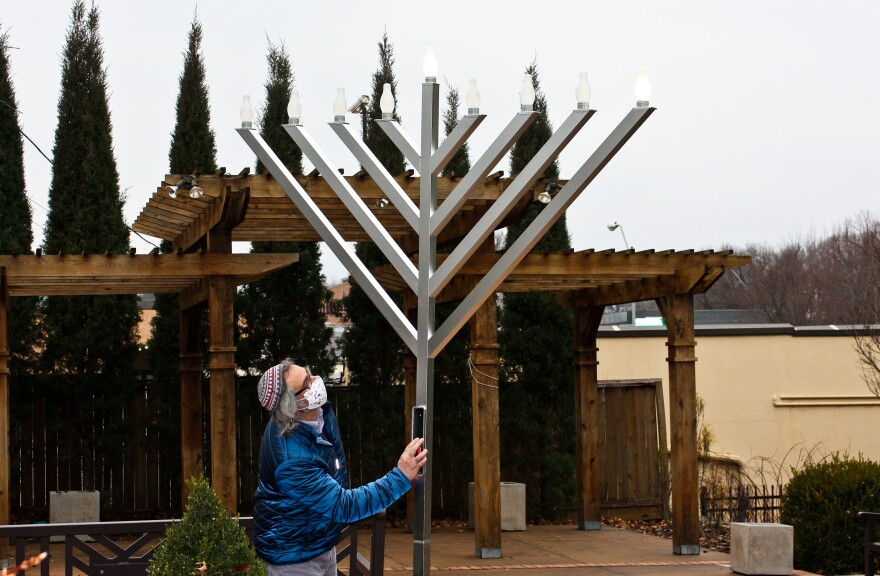Pastor Ronald Lindsay’s voice brightens as he talks about his church’s past Christmas celebrations.
“We do a variety of songs of faith and secular songs that are endearing to us in the moment of Christmas, have a few testimonies, maybe a story, a narrative that is moving that invites us to visit why the birth of Christ is important,” he explains about his services at Concord Fortress of Hope in Kansas City, Missouri, where he’s been the pastor for 30 years.
This winter, all places of worship will alter the routines for even their holiest of days. For the first time, Lindsay won't be face to face with his parishioners. He says that while he’ll miss seeing the children dressed up and excited, he’s enjoying the creativity of figuring out how to deal with the challenges.
After all, he says, the church is built for moments when things don’t go well.
“It’s institutionalizing that has caused the church to lose her creativity, so I think this moment in time invites us again to remember the why of the church, and how she really does flourish in times like this,” Lindsay says.
Rabbi Alan Londy of Kansas City’s New Reform Temple agrees.
“People think that religious institutions are not dynamic,” Londy says. “Religious institutions are the most dynamic. Judaism, Christianity, Islam, other faith traditions over time are constantly reinventing themselves to stay relevant.”
The final candle lighting of Hanukkah took place on December 17. Londy says he’d been interested in purchasing a large, outdoor menorah for a decade, but until this year others in the synagogue hadn’t seen a need.
“Since the pandemic, this idea of an outdoor one took on a different or greater significance,” he says.

Their new 9-foot-tall menorah allowed many of the 200 families who are members some semblance of normalcy this year, as they gathered in the parking lot each night of Hanukkah. Londy chose someone new each night to flip the switch.
Other than that, he’s kept all worship and classes online since March, and he’s seen the synagogue strengthen as a community. With regular Friday night services all online now, he’s seen a tenfold increase in the number of people watching.
“People want connection,” Londy says. “The pandemic has created isolation, and I think there’s a feeling of need that people want to be together.”
He’ll continue to offer virtual services even when members and visitors can safely gather indoors. Londy thinks that would have happened eventually anyway as the next generation rises to leadership.
The Hindu Temple and Cultural Center of Kansas City in Shawnee has also been airing ceremonies online. But Sridhar Haraholli, an IT professional who acts as a volunteer manager at the center, says that because some devotees want to worship daily or on particular days of the week, they have kept the doors open.
Haraholli says the temple's priests, who serve thousands of Hindus across the entire metro, have been busier than usual this year with people seeking comfort and help in a turbulent season.
“Nothing has stopped at the temple,” he says. “The temple is open for services and the priests are doing whatever needs to happen. The priests have been coming every day.”
With the help of an online sign up form, the temple allows no more than 10 masked people in the building at a time. This, in combination with online worship, is how they’ll handle Geeta Jayanti, a major south Indian holiday, on Dec. 25.
Last month, Diwali, the festival of lights, was a little trickier, but Haraholli says with the help of a lot of volunteers, they kept devotees safe.
In a regular year, the three-day celebration can draw more than 2,000 people. Haraholli says temple leaders kept that in mind as worshipers showed up.
“We also keep in mind people’s religious sentiments, and we cannot turn people away when they come over to the temple for the service. We cannot simply say ‘go back.’”
Bishop Cathleen Bascom, who presides over 44 churches in the Episcopal Diocese of Kansas, says not being able to worship together or take communion has been difficult, but, she hopes, the restrictions will ultimately be good for everyone.

She says that Episcopalians believe that God is everywhere and wants believers to be in the world “working on justice, racial reconciliation, and on economic justice.”
“Times of crisis kind of kick us out of our church buildings and (help us) remember what it’s all about,” Bascom says. “I hope that we’ll be aware of that. God is not in religious corners that we put God in, but God is ready to meet us wherever God’s people are.”
She’s tried not to issue blanket moratoriums on meeting, because some of the churches in the diocese may only have nine congregants and would be safe to meet for an abbreviated service.
Church leaders have told her some of their plans for Christmas, including: members all singing the same song on their front porches at a designated time; groups of fewer than 25 singing masked and 10 feet apart outdoors and then gathering inside for a very brief service; parking at church and listening to the service together through their car radios; virtual pageants; and children receiving care packages of advent activities they can do at home.
Lindsay says he’ll try to keep the Christmas service at Concord Fortress of Hope as similar as possible to what people are used to, just online. His church is higher tech than some, because Lindsay started some online worship about four years ago.

He says that, among other components, the church’s producers will include a five-minute block of children wishing people merry Christmas. He laughs thinking about a clip of a brother and sister telling their grandmother merry Christmas that deteriorates into bickering until the mother steps in.
Lindsay says, “We intentionally tried to make it human and flawed and kind of crazy, just so people can get the spirit of the moment.”






